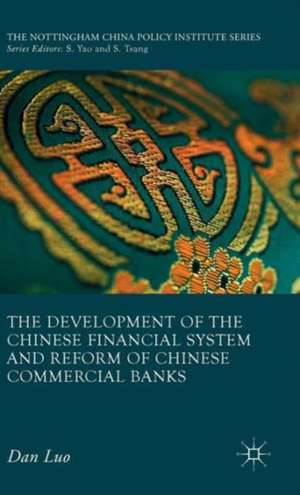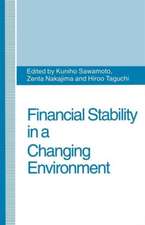The Development of the Chinese Financial System and Reform of Chinese Commercial Banks: The Nottingham China Policy Institute Series
Autor D. Luoen Limba Engleză Hardback – 8 feb 2016
Preț: 641.71 lei
Preț vechi: 754.95 lei
-15% Nou
Puncte Express: 963
Preț estimativ în valută:
122.79€ • 128.53$ • 102.20£
122.79€ • 128.53$ • 102.20£
Carte tipărită la comandă
Livrare economică 31 martie-14 aprilie
Preluare comenzi: 021 569.72.76
Specificații
ISBN-13: 9781137454652
ISBN-10: 1137454652
Pagini: 247
Ilustrații: XIII, 247 p.
Dimensiuni: 140 x 216 x 16 mm
Greutate: 0.45 kg
Ediția:1st ed. 2016
Editura: Palgrave Macmillan UK
Colecția Palgrave Macmillan
Seria The Nottingham China Policy Institute Series
Locul publicării:London, United Kingdom
ISBN-10: 1137454652
Pagini: 247
Ilustrații: XIII, 247 p.
Dimensiuni: 140 x 216 x 16 mm
Greutate: 0.45 kg
Ediția:1st ed. 2016
Editura: Palgrave Macmillan UK
Colecția Palgrave Macmillan
Seria The Nottingham China Policy Institute Series
Locul publicării:London, United Kingdom
Cuprins
List of Tables and Figures
Introduction
Chapter 1 Evolution of the Chinese Banking System
Chapter 2 efficiency Analysis of the Chinese Banking Sector
Chapter 3 The Change of Corporate Governance Practise of Chinese Commercial Banks
Chapter 4 The Financial Crisis and the Influence on the Chinese Banking Sector
Chapter 5 Foreign Penetration and Its Impact on the Chinese Banking Sector
Chapter 6 Shadow Banking and Its Development in China
Chapter 7 The Role of Central Bank and the influence of China's Monetary Policy on Asset Pricing
Conclusion
Index
Introduction
Chapter 1 Evolution of the Chinese Banking System
Chapter 2 efficiency Analysis of the Chinese Banking Sector
Chapter 3 The Change of Corporate Governance Practise of Chinese Commercial Banks
Chapter 4 The Financial Crisis and the Influence on the Chinese Banking Sector
Chapter 5 Foreign Penetration and Its Impact on the Chinese Banking Sector
Chapter 6 Shadow Banking and Its Development in China
Chapter 7 The Role of Central Bank and the influence of China's Monetary Policy on Asset Pricing
Conclusion
Index
Notă biografică
Dr Dan Luo is lecturer in Business and Finance at the School of Contemporary Chinese Studies (SCCS). She previously worked as a research fellow in the Centre of Global Finance, University of the West of England. She was a post-doctorate research fellow at School of Contemporary Chinese Studies, University of Nottingham, where she was awarded her PhD and MA in Finance and Investment. She obtained her BA (Hons) Management in Accounting and Finance from Beijing Institute of Technology, China in 2005. She has been a member of the Association of Chartered Certified Accountants (ACCA) since 2007. Dr Luo's research interests focus on the Chinese financial market, in particular the banking sector and stock market. She has also conducted intensive research on asset pricing, stock market volatility and income inequality. Her work has been published in leading journals such as The World Economy and The Journal of Applied Financial Economics.
Textul de pe ultima copertă
The Chinese financial sector, despite having been developed at a much later stage compared with other developed nations, has achieved substantial progresses over the past decades. By the end of 2014, a total of 16 commercial banks had been listed on the stock exchanges, exerting strong impact onto the market indices and contributing significantly to the country's sustained economic growth.
This book reviews the evolution of the Chinese financial system, examining the effectiveness of reform strategies made by the government over the last ten years. The first chapter offers a comprehensive review of the development of the Chinese banking sector and the state-owned banks (SOBs). The second chapter focuses on the efficiency of the Chinese banking sector. Employing data envelopment analysis (DEA) and stochastic frontier analysis (SFA), the author tests the change of efficiency within the Chinese banking sector over the past decade. It also looks at the strategy adopted by the Chinese government as the final attempt in reforming its troublesome SOBs and the effectiveness of such a reform strategy. The next chapter examines the corporate governance practise of the Chinese commercial banks, and the author follows by investigating the effect of the 2007 US credit crunch on Chinese banks and the country's wider economy. Other chapters survey the influence of foreign entry to the Chinese domestic banking sector, and the development of shadow banking in China.
The author concludes by discussing the role of the central bank, namely the People's Bank of China (PBOC), and its role in implementing effective policies to promote economic growth.
This book reviews the evolution of the Chinese financial system, examining the effectiveness of reform strategies made by the government over the last ten years. The first chapter offers a comprehensive review of the development of the Chinese banking sector and the state-owned banks (SOBs). The second chapter focuses on the efficiency of the Chinese banking sector. Employing data envelopment analysis (DEA) and stochastic frontier analysis (SFA), the author tests the change of efficiency within the Chinese banking sector over the past decade. It also looks at the strategy adopted by the Chinese government as the final attempt in reforming its troublesome SOBs and the effectiveness of such a reform strategy. The next chapter examines the corporate governance practise of the Chinese commercial banks, and the author follows by investigating the effect of the 2007 US credit crunch on Chinese banks and the country's wider economy. Other chapters survey the influence of foreign entry to the Chinese domestic banking sector, and the development of shadow banking in China.
The author concludes by discussing the role of the central bank, namely the People's Bank of China (PBOC), and its role in implementing effective policies to promote economic growth.























